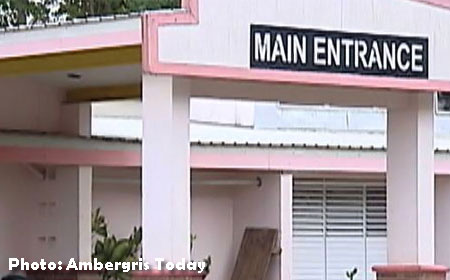BELMOPAN, Tues. Sept. 8, 2015–As Amandala readers will recall, less than six months ago it was reported that Western Regional Hospital was dealing with a rat infestation problem. These rodents had gained access to the hospital’s food pantry, where groceries for the patients and the staff were stored.
Despite efforts made to address the problem, five months later, the problem has not gone away. In fact, the affliction has climaxed with the biting of a newborn baby girl (born prematurely on Thursday night, September 3) by a rat which was able to enter her incubator in the hospital’s Neonatal Intensive Care Unit. Administrators at the hospital have speculated that the rat entered the room via an opening in the wall in the room through which the vent for an AC unit had been installed.
One of the nurses from the Western Regional Hospital staff, one Nurse Guerra, told the newspaper that the incident occurred in the neonatal unit at 1:39 a.m. on Friday, September 4. “The nurse just turned her back to do something and she heard the baby scream. She immediately responded by removing the baby from the incubator,” she said.
A doctor on duty was called in, and he evaluated the baby, who was bitten on the right toe. The hospital claims that the baby, notwithstanding a visible bite that will take time to heal, is doing well.
Guerra said yesterday that the mother and baby had been discharged from the hospital.
Even though mother and child are reportedly in fairly good condition, this incident has surely eroded the general public’s confidence in the institution. Now the Western Regional Hospital, along with the Ministry of Health, has pledged to do all it can to eradicate the problem and regain the public’s trust in the institution.
Guerra mentioned a number of steps that the Public Health Department has either undertaken or will undertake to get rid of the rodents.
They are as follows:
• Strict sanitation and infection-control of the hospital
• Immediate disinfection of the nursery area and incubatory where the incident occurred
• Placement of rat traps and rat poison at strategic points throughout the hospital to help eradicate the rodents
• Frequent and prompt removal of garbage from the hospital compound
• Identification and sealing of electrical wiring and plumbing
• Fitting of doors with metal plating to prevent rats from gaining entrance
Dr. Ramon Figueroa, Director of Health Services, said there are contributory factors which have led to the problem, such as the age of the facility. Also, the drainage and a pipeline situated under the hospital are difficult to access, and have become a breeding ground for rats.
He added that the ideal situation would be to build a new hospital; however, there are plans on the way to add a new wing to the hospital. This addition will be made possible through a grant for US $15 million approved by the European Union. The new wing will have 50 new beds, bringing the total beds for Western Regional Hospital to 100.
Dr. Figueroa said that there was an evaluation of all the regional hospitals conducted by the Pan American Health Organization (PAHO), which looks at the infrastructure, energy efficiency and water consumption of the hospital.
This evaluation was measured against some international standards for a safe and efficient hospital. While the hospital’s score was average, there is much progress to be made. Dr. Figueroa said there is a regional team put in place to address the weak areas the evaluation identified.

